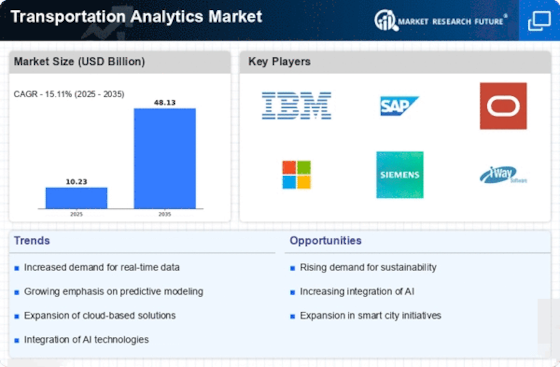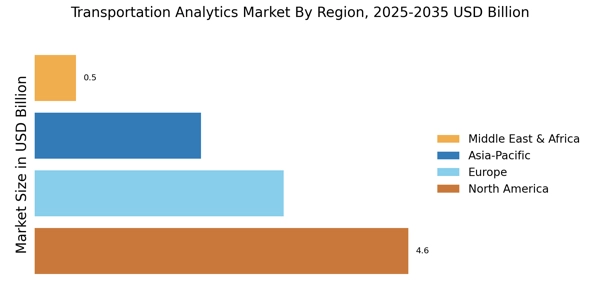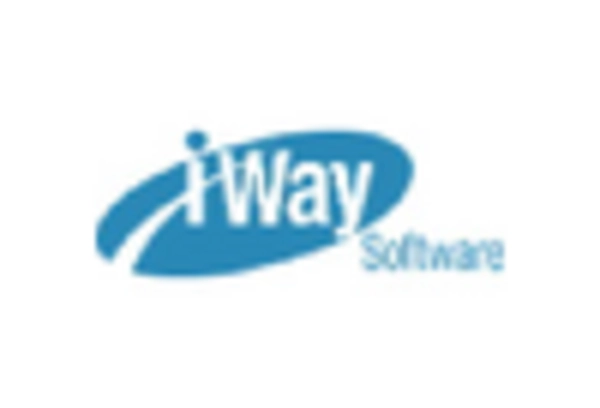Advancements in Technology
Technological advancements are significantly influencing the Transportation Analytics Market. The proliferation of Internet of Things (IoT) devices and sensors is enabling the collection of vast amounts of data from various transportation modes. This data can be analyzed to derive insights that improve operational efficiency and safety. The market is witnessing innovations in data processing capabilities, with cloud computing and edge analytics becoming more prevalent. These technologies facilitate the real-time analysis of transportation data, allowing for quicker responses to emerging challenges. As organizations increasingly adopt these advanced technologies, the Transportation Analytics Market is expected to expand, with a projected growth rate of approximately 20% over the next five years. This trend indicates a shift towards more data-centric approaches in transportation management.
Rising Consumer Expectations
Rising consumer expectations are significantly impacting the Transportation Analytics Market. As consumers demand faster and more reliable transportation services, companies are compelled to adopt analytics solutions that enhance service delivery. The ability to analyze customer data and preferences allows organizations to tailor their offerings and improve customer satisfaction. Moreover, the integration of analytics into transportation systems enables companies to provide real-time updates and transparency regarding service status. This responsiveness is becoming a critical differentiator in a competitive market. Research indicates that companies that effectively utilize analytics to meet consumer expectations can see an increase in customer loyalty and retention rates. As such, the pressure to meet these rising expectations is likely to drive further investment in transportation analytics solutions.
Growing Focus on Cost Reduction
The Transportation Analytics Market is witnessing a growing focus on cost reduction among organizations. Companies are increasingly turning to analytics solutions to identify inefficiencies and optimize resource allocation. By leveraging data analytics, organizations can uncover hidden costs and streamline operations, leading to substantial savings. For instance, predictive analytics can help in forecasting demand and managing inventory more effectively, thereby reducing excess costs. The potential for cost savings is a compelling driver for the adoption of transportation analytics, as businesses seek to enhance their bottom line. Market Research Future indicates that organizations utilizing analytics solutions can achieve cost reductions of up to 15% in their transportation operations. This trend underscores the importance of analytics in fostering financial sustainability within the industry.
Increased Demand for Real-Time Data
The Transportation Analytics Market is experiencing a surge in demand for real-time data analytics. Organizations are increasingly recognizing the value of timely information in optimizing operations and enhancing decision-making processes. According to recent statistics, the market for real-time analytics is projected to grow at a compound annual growth rate of over 25% in the coming years. This growth is driven by the need for improved efficiency and responsiveness in transportation systems. Companies are leveraging advanced analytics to monitor traffic patterns, vehicle performance, and supply chain logistics, thereby reducing delays and costs. The integration of real-time data into transportation analytics not only enhances operational efficiency but also contributes to better customer satisfaction, as stakeholders can make informed decisions based on current conditions.
Government Initiatives and Regulations
Government initiatives and regulations are playing a pivotal role in shaping the Transportation Analytics Market. Various governments are implementing policies aimed at improving transportation infrastructure and promoting the adoption of analytics solutions. For instance, funding programs for smart city projects are encouraging municipalities to invest in transportation analytics technologies. These initiatives are expected to drive market growth, as they create a conducive environment for innovation and investment. Furthermore, regulations focused on safety and environmental sustainability are compelling transportation companies to adopt analytics solutions that enhance compliance and operational transparency. The increasing emphasis on data-driven decision-making in public transportation systems is likely to further propel the demand for analytics solutions.


















